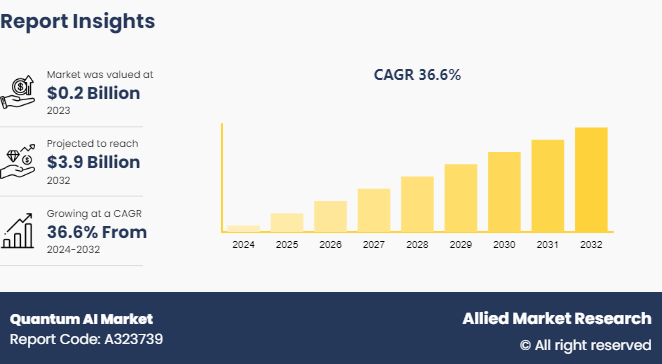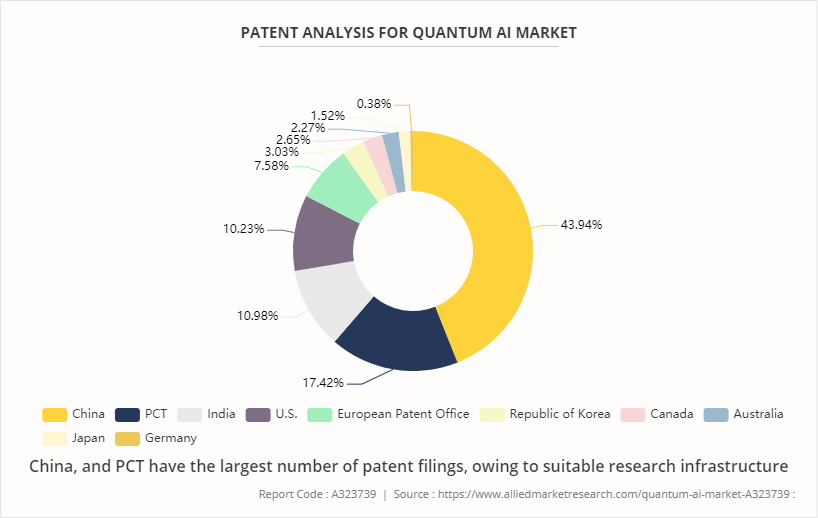Quantum AI Market Research, 2032
The Global Quantum AI Market was valued at $0.2 billion in 2023 and is projected to reach $3.9 billion by 2032, growing at a CAGR of 36.6% from 2024 to 2032.
Quantum AI refers to the application of quantum computing principles and technologies to enhance artificial intelligence (AI) processes. Quantum AI leverages the unique capabilities of quantum computers, such as superposition and entanglement, to perform complex calculations and solve problems more efficiently than classical computers. By utilizing qubits instead of traditional binary bits, quantum AI aims to accelerate the training of AI models and improve the performance of machine learning algorithms across various industries, including automotive and pharmaceutical.

Key Takeaways
Based on components, the hardware segment dominated the Quantum AI Market Forecast in terms of revenue in 2023.
On the basis of the deployment model, the on-premises segment dominated the Quantum AI market size in terms of revenue in 2023 and is anticipated to grow at the fastest CAGR during the forecast period.
On the basis of application, the machine learning and optimization segment dominated the Quantum AI market size in terms of revenue in 2023 and is anticipated to grow at the fastest CAGR during the forecast period.
Region-wise, North America generated the largest revenue in 2023. However, Asia-Pacific is anticipated to grow at the highest CAGR during the forecast period.
Industry Trends:
The emergence of digital banking services and the development of fintech ecosystems worldwide have raised the number of electronic financial records about banks and their customers, which are vulnerable to cybercrime incidents. These drive the adoption of quantum cryptography solutions in data management among the banks due to their applications in protecting the banks' network, applications, and data from quantum computing-based cyberattacks.
The volume of digital payment users is increasing exponentially, especially since the COVID-19 pandemic. According to the RBI, around 114 billion digital payments were made in India in FY 2023. The growth of digital payments in line with the trend of a cashless society is raising the demand for the quantum cryptography market in banks because electronic payments rely on encryption to protect customers and businesses from cyberattacks. This can be further secured by upgrading traditional encryption to quantum encryption in processing the payment data, which would support the market’s growth in the future.
For instance, in July 2023, HSBC was the first bank to join BT and Toshiba’s quantum-secured metro network, connecting two UK sites using Quantum Key Distribution (QKD) to prepare its global operations against future cyber threats. Using an AWS Snowball Edge device, this technology would be trialed in multiple scenarios, including financial transactions, secure video communications, one-time pad encryption, and AWS edge computing capabilities, showing the increasing demand for quantum cryptography solutions in the BFSI sector in the future.
Key Market Dynamics
The integration of quantum computing in cloud services is a primary driver for the quantum AI market. Cloud computing has become the backbone of modern IT infrastructure, offering scalable and accessible resources for businesses and individuals. The integration of quantum computing into cloud services democratizes access to quantum technologies, allowing users to experiment with quantum algorithms and applications without the need for expensive hardware investments. Cloud providers are increasingly offering quantum computing services, enabling developers and researchers to explore Quantum AI capabilities and accelerate innovation. Thus, this integration expands the reach of Quantum AI, driving adoption and fueling market growth.
However, high deployment and limited accessibility pose a significant restraint to the widespread adoption of Quantum AI solutions. Quantum computing technology is currently expensive to develop and operate, making it inaccessible to many organizations and researchers. The high costs associated with building and maintaining quantum hardware, as well as the specialized expertise required for quantum algorithm development, pose barriers to entry for smaller companies and institutions. Moreover, accessing quantum computing resources often involves collaboration with major technology companies or academic institutions, further limiting accessibility. As a result, the Quantum AI market is constrained by the limited availability of affordable and accessible quantum computing resources.
Furthermore, the rise of quantum cloud services and quantum as a service (QaaS) presents a significant opportunity for the Quantum AI market. Cloud providers are increasingly offering access to quantum computing resources via cloud platforms, democratizing access to quantum technology and lowering barriers to entry for developers and researchers. QaaS enables users to experiment with quantum algorithms, conduct simulations, and prototype Quantum AI applications without the need for significant upfront investments in quantum hardware. This accessibility accelerates innovation in Quantum AI by fostering collaboration, experimentation, and the development of practical quantum solutions across diverse industries, ultimately driving market growth and adoption.
Patent Analysis of the Global Quantum AI Market
The global Quantum AI industry is segmented according to the patents filed in China, PCT, India, the United States of America, the European Patent Office, the Republic of Korea, Canada, Australia, Japan, and Germany. China and PCT have the largest number of patent filings, owing to suitable research infrastructure. Approvals from these authorities are followed/accepted by registration authorities in many of the developing regions/countries. Therefore, these two regions have the maximum number of patent filings.

Market Segmentation
The Quantum AI industry is segmented into components, deployment models, applications, and regions. Based on components, the market is segmented into hardware, software, and services. By the Deployment Model, the market is divided into on-premises and cloud-based. On the basis of application, the market is segmented into machine learning and optimization, cryptography and security, and simulation and modeling. Region-wise, the Quantum AI Industry is analyzed across North America, Europe, Asia-Pacific, and LAMEA.
Market Segment Outlook
Based on component, the hardware segment held the highest market share in 2023, accounting for more than half of the market share and is projected to have the highest CAGR during the forecast period, owing to quantum hardware constitutes the physical infrastructure essential for quantum computing, encompassing quantum processors, qubits, quantum gates, and associated components. The dominance of hardware is primarily attributed to the foundational nature of quantum processors and their critical role in executing quantum computations. Companies like IBM, Google, and Rigetti Computing have made substantial investments and breakthroughs in developing powerful quantum processors, pushing the boundaries of qubit stability, coherence, and scalability. These advancements in hardware have enabled the execution of more complex quantum algorithms, significantly influencing the overall performance and capabilities of Quantum Al systems.
Based on the deployment model, the on-premises segment held the highest market share in 2023, accounting for nearly half of the Quantum AI market share due to several key factors that emphasize the strategic advantages of implementing quantum computing capabilities within an organization's physical infrastructure. On-premises deployment involves establishing and operating quantum computing resources directly within the organization's facilities, providing a level of control, security, and customization that appeals to many enterprises. The dominance of the on-premises segment is the heightened sensitivity of certain industries, such as finance, healthcare, and government, to data security and privacy concerns. By having quantum computing resources on-premises, organizations can exert greater control over their data, ensuring that sensitive information does not traverse external networks.
Based on application, the machine learning and optimization segment held the highest market share in 2023, accounting for nearly half of the Quantum AI market share due to several factors. Machine learning and optimization play a crucial role in various industries, including finance, healthcare, and manufacturing, driving the demand for quantum AI solutions to enhance computational power and efficiency. Moreover, optimization tasks, such as portfolio optimization in finance or supply chain optimization in logistics, benefit significantly from quantum AI's ability to solve complex problems more efficiently than classical computing methods.
Regional/Country Market Outlook
Based on region, the Quantum AI market is analyzed across North America, Europe, Asia Pacific, and LAMEA. In North America, the U.S. dominated the quantum AI market size by country due to a confluence of factors that position the region at the forefront of advancements in quantum computing and artificial intelligence. The United States is home to some of the world's leading technology companies and research institutions that are spearheading innovation in quantum computing. Quantum Al's dominance in North America is underscored by the significant investments made by major technology players like IBM, Google, and Microsoft in developing and commercializing quantum computing technologies. These companies have established quantum computing research labs, collaborated with academia, and rolled out cloud-based quantum computing services, fostering an environment of innovation and experimentation.
Competitive Landscape
The major Quantum AI manufacturers are IBM Corporation, Google Inc., Rigetti Computing, D-Wave Quantum Inc., Microsoft Corporation, Amazon Web Services, Fujitsu, Hitachi, Toshiba Corporation, and Intel Corporation.
Recent Key Strategies and Developments
In June 2023, Beyond Limits, an enterprise Al software company, entered an industry-first Memorandum of Understanding (MOU) with IQM Quantum Computers, a leading European quantum computing builder. The collaboration aims to advance quantum Al technology in the Asia Pacific (APAC) region. Focusing on breakthroughs, the partnership will develop hybrid quantum Al algorithms, which are recognized as a top-five future technology by the Infocomm Media Development Authority of Singapore (IMDA).
In November 2022, Tata Consultancy Services inaugurated a TCS Quantum Computing Lab in the virtual realm using Amazon Web Services (AWS). The primary objectives of this initiative are to formulate and assess enterprise business solutions as well as expedite the integration of quantum computing. TCS aims to utilize the lab for crafting cutting-edge solutions, establishing performance benchmarks tailored to specific domains, and fostering hackathons to drive innovation.
Key Sources Referred
Semiconductor Industry Association (SIA)
SEMI.org
International Energy Agency
IEEE Electron Devices Society (EDS)
U.S. Department of Energy
Global Semiconductor Alliance (GSA)
World Economic Forum
European Semiconductor Industry Association (ESIA)
Key Benefits For Stakeholders
- This report provides a quantitative analysis of the market segments, current trends, estimations, and dynamics of the quantum AI market from 2024 to 2032 to identify the prevailing quantum AI industry report.
- The market research is offered along with information related to key drivers, restraints, and opportunities.
- Porter's five forces analysis highlights the potency of buyers and suppliers to enable stakeholders to make profit-oriented business decisions and strengthen their supplier-buyer network.
- In-depth analysis of the quantum AI market segmentation assists in determining the prevailing Hybrid Quantum AI market opportunities.
- Major countries in each region are mapped according to their revenue contribution to the global market.
- Market player positioning facilitates benchmarking and provides a clear understanding of the present position of the market players.
- The report includes the analysis of the regional as well as global quantum AI market trends, Quantum AI for U.S. Market, quantum AI manufacturer, quantum AI company List, quantum AI market share by companies, Quantum AI Sector Analysis, Quantum AI Market Data, market segments, Quantum AI Market Insights, application areas, and market growth strategies.
Quantum AI Market Report Highlights
| Aspects | Details |
| Market Size By 2032 | USD 3.9 Billion |
| Growth Rate | CAGR of 36.6% |
| Forecast period | 2024 - 2032 |
| Report Pages | 250 |
| By Deployment Mode |
|
| By Application |
|
| By Component |
|
| By Region |
|
| Key Market Players | Hitachi, D-Wave Quantum Inc., Fujitsu, IBM Corporation, Google Inc., Intel Corporation., Toshiba Corporation, Microsoft Corporation, Rigetti Computing, Amazon Web Services |
Loading Table Of Content...


